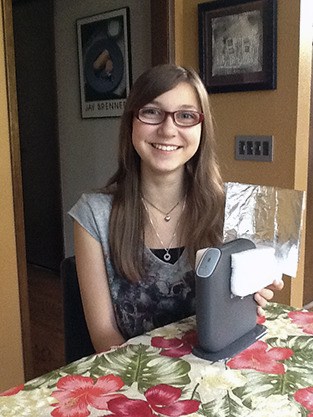Thirteen-year-old Mercer Island native Larissa Bitners is not your typical teenager.
Recently selected as one of the 90 finalists in the global Google Science Fair competition, the singularly gifted Bitners is already trailblazing new paths in the world of science.
Google’s online science competition invites young people from around the world to “be curious, ask questions, and perform science experiments to answer those questions.” Last year’s winner from the 13-14 age group worked to help individuals with hearing loss enjoy a superior music experience by employing multi-frequency tactile sound.
Bitners’ project involved experimenting whether a parabolic reflector could expand the range of a wireless network signal, and increase its security by directing radio waves to a particular area while blocking signals from neighboring properties. And if that sounds complicated, you’re certainly not alone.
Dubbed ‘the fix-it girl’ by her mother, Melinda, Bitners has had a knack for technology and science her entire life.
“She was one of those babies who took apart the remote control,” Melinda recalls. At age 7, Bitners dismantled and reassembled a transistor radio, and would later express puzzlement when discovering that her father didn’t know how to put window wipers on the family car, to her a seemingly uncomplicated task.
Tonya van Orden, her science teacher at Islander Middle School, asked her class to create projects in response to the same questions that the Google Science Fair had requested that contestants explore. However, the students weren’t required to submit their projects for actual competition.
Completed in merely a week and tested with the help of her dad, Bitners didn’t register that her project was something out of the ordinary, until van Orden approached Melinda Bitners with the suggestion that her daughter enter the project in the international competition.
“It was original,” van Orden recalls. After three years of giving out the assignment, van Orden had seen many students devise similar experiments, until Bitners handed in her project. She characterized her student’s work as clear and simple, a rare trait in science experiments these days.
“As scientists, we have to make what we do understandable to the rest of the world,” van Orden explains. Bitners did just that with her accessible and practical experiment.
She sat on the idea of submitting it to the global competition for a long time, and waited until minutes before the deadline to submit her experiment.
Her decision paid off, and Bitners was announced as one of 90 regional finalists from around the globe.
Not overly concerned with the outcome, one might find Bitners playing video games or practicing percussion for Islander Middle School’s jazz band instead of fretting over the Google Science Fair’s ultimate decision. Despite her cool and collected exterior, her mother suspects that she is excited about Google Science Fair’s recognition of her work.
“I think she is probably pretty proud of how far she’s gotten,” her mother said. And proud she should be.
Though Bitners narrowly missed making one of the top 15 spots when they were announced on June 27, Melinda explains that this development is something her daughter is not at all discouraged by, as “she didn’t think her project was earth-changing.” Other experiments from her age group that advanced in the competition involved helping endangered species and solving the shortage crisis of rare-earth elements. However, Melinda is sure her daughter will compete in the Google Science Fair again in the future.
Having only just finished eighth grade, Larissa Bitners should be on Mercer Island’s radar as one to watch in coming years.


